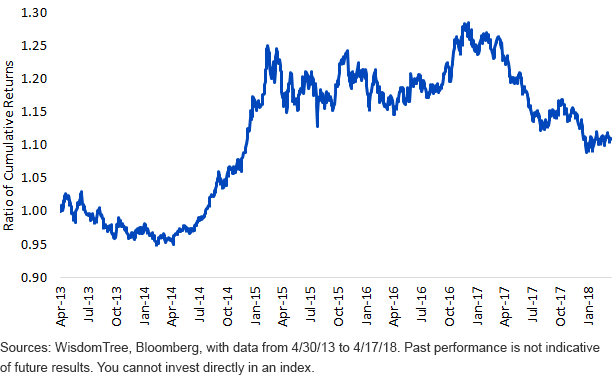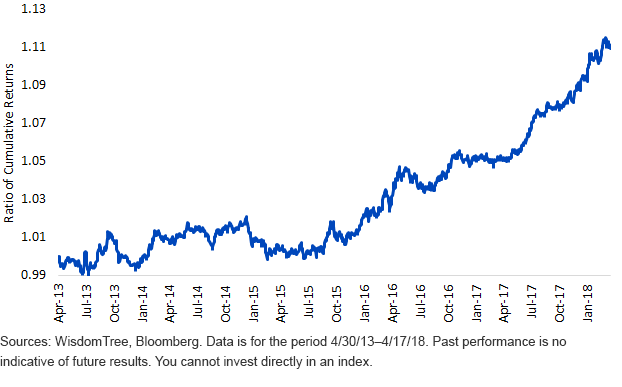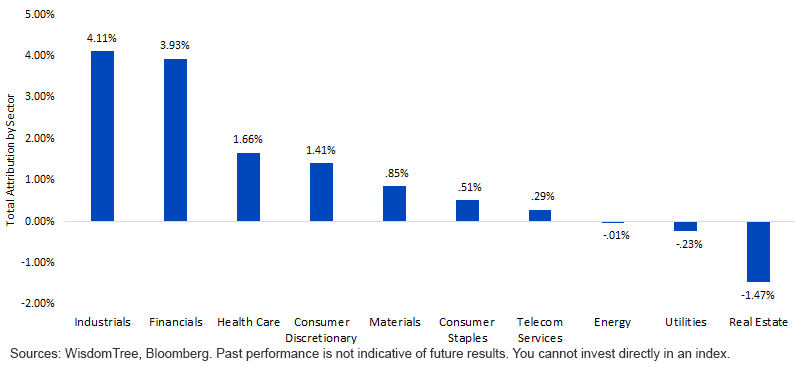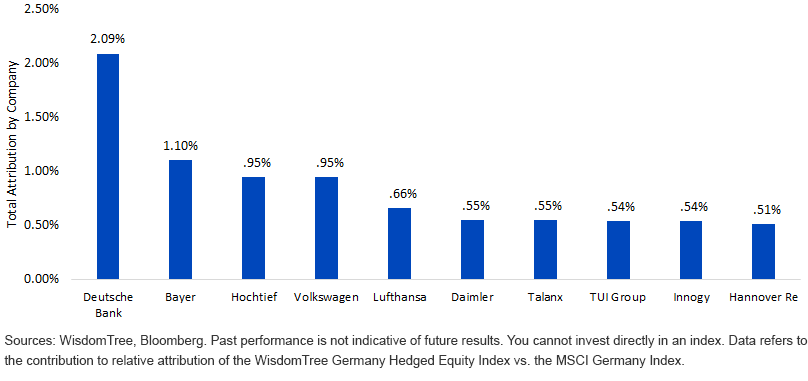The Euro Has Been Appreciating—Did It Matter For German Exporters?
Much has been made of the recent trend of dollar weakness, particularly against the euro. As of this writing, it was at $1.24. As recently as April 2017, it was at $1.06.1
Has It Mattered for Equity Investors?
On the face of it, the answer to this question has been yes. U.S. investors haven’t necessarily fled European stocks—but they have fled currency-hedged equity strategies. Importantly, we have to call this trend what it is: chasing past returns.2
- From ratio analysis of the return of the WisdomTree Germany Hedged Equity Index (hedged) vs. the WisdomTree Germany Equity Index (unhedged), we can see that since early January 2017 to April 17, 2018, the unhedged version of the same stocks has outperformed by more than 17%. When investors go “unhedged” with their European exposures today, this 17% is what they’re thinking about. It’s just “FOMO”—Fear of Missing Out on further euro appreciation (even if almost all investors we speak to would tell us they don’t know where the euro will go from here).
- The reality is that there is no reason to assume that either the hedged or unhedged version of these same stocks will always outperform or always underperform. Can the euro appreciate further from here? Absolutely. But everything we know today, whether central bank policy or shifts in U.S. administration policy, is already reflected in the 17% move. What don’t we know currently that can cause the next bout of euro appreciation? That’s the true question that unhedged European equity investors should be asking.
Ratio of WisdomTree Germany Hedged Equity Index to WisdomTree Germany Equity Index (Rising = Euro Depreciating; Falling = Euro Appreciating)

Exporters vs. the Broad Market Capitalization-Weighted Benchmark for Germany
Digging a layer deeper, WisdomTree developed the WisdomTree Germany Hedged Equity Index to deliver distinctly different performance than the MSCI Germany Index. Our Index is dividend weighted and selects stocks that have less than 80% of their revenues from inside Germany, as opposed to market capitalization-weighted with a broad market focus.
From March 2015 to April 2018, though—even in light of over 10% euro appreciation—the upward slope of the line indicates the export-tilted WisdomTree Index is currently outperforming the broad German equity market. This is counterintuitive, as most investors wouldn’t expect an export-focused strategy to outperform by approximately 13% cumulatively in that environment.
Ratio of WisdomTree Germany Hedged Equity Index to MSCI Germany Index (Rising = Exporters Outperforming; Falling = Exporters Underperforming)

Dissecting What an Export Tilt Meant for German Equities
Most of Germany’s equity market pays dividends, so the dividend-focused nature of WisdomTree’s approach wouldn’t necessarily be expected to explain this type of difference in returns. Performing a sector-focused attribution showed the following:3
- The Industrials (+4.53% over-weight), Financials (+1.82% over-weight) and Health Care (-4.85% under-weight) sectors were responsible for the bulk of the WisdomTree Germany Hedged Equity Index’s outperformance of the MSCI Germany Index.
- In reality, stock selection within these three sectors was the true driver of the total attribution figures. For example, the Industrials sector within the WisdomTree Index returned nearly 58% over this period, while the same sector within the MSCI Germany Index returned only 39%. In Financials, the result was even more stark: 43% versus 20%. Health Care was a rough sector for Germany over this period, but instead of dropping slightly like the benchmark, the WisdomTree Index gained almost 9% in this sector.
Total Attribution of WisdomTree Germany Hedged Equity Index vs. MSCI Germany Index (3/31/2015–4/17/18)
(Click on image to enlarge)

Germany’s Idiosyncratic Issues of Recent Years
Deutsche Bank and Volkswagen are two examples of companies with unique issues over the period that we’re studying here, approximately three years.
- Deutsche Bank was down more than 50% cumulatively over this period.
- Volkswagen was down over 15% cumulatively over this period.
Both companies are very large on a market capitalization basis and they were both under-weighted in the WisdomTree dividend-weighted universe that contributed positively to excess performance.
Bayer, the drug company, also was one of the worst-performing stocks in a market cap index but was under-weighted using the dividend approach, and that also was one of top contributors to excess returns.
Top 10 Companies That Contributed Positively to WisdomTree’s Relative Performance (WisdomTree Germany Hedged Equity Index vs. MSCI Germany Index)
(Click on image to enlarge)

As investors contemplate whether the dramatic rise in the euro over the last 12–15 months is sustainable, especially in light of a new economic adviser in the White House who has a bias toward a “King Dollar” policy, the WisdomTree Germany Hedged Equity Index could represent an interesting basket of globally oriented companies that were resilient even during a rising euro environment.
1Source: Bloomberg. Data is as of 4/17/18 and then as of 4/7/17.
2Source for bullets: Bloomberg, with data current as of 4/17/18 writing.
3Sources for attribution: WisdomTree, Bloomberg. Bloomberg PORT function used for the period 3/31/15–4/17/18. Month-end start date corresponds to MSCI Germany Index constituent data access.
Disclaimer: Investors should carefully consider the investment objectives, risks, charges and expenses of the Funds before investing. U.S. investors only: To obtain a prospectus containing this ...
more


